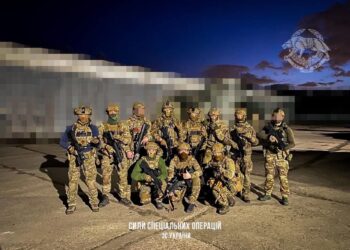The head of Britain’s foreign intelligence service, Richard Moore, accused Russia on Friday of carrying out a “staggeringly reckless” sabotage campaign across Europe while escalating nuclear threats in an effort to deter Western support for Ukraine. Speaking at an event in Paris with Nicolas Lerner, the chief of France’s intelligence agency DGSE, Moore warned that allowing Russia to succeed in Ukraine would jeopardize global security.
According to Moore, Western intelligence agencies have uncovered Russian-backed plots aimed at destabilizing Ukraine’s allies. These include incidents of arson, disinformation campaigns, and incendiary devices disguised as packages. One such device caused a fire at a DHL warehouse in Birmingham in July. Moscow has also been accused of planning attacks on Ukrainian-owned businesses in Europe.
Moore described these operations as part of a broader Russian strategy to erode Western resolve and disrupt unity among Ukraine’s supporters. “Putin’s goal is to challenge Western resolve, using a dangerous mix of sabotage and nuclear threats,” he said.
Moore highlighted recent Russian nuclear threats, including the potential use of an intermediate-range ballistic missile against Ukrainian decision-making centers. Russia has also intensified missile and drone strikes on Ukraine’s energy infrastructure in retaliation for Kyiv’s use of U.S.-supplied ATACMS missiles to target Russian territory. These actions, Moore said, are designed to create fear and hesitation among Ukraine’s allies.
Moore warned that a failure to support Ukraine would have severe consequences for global security. “If Putin is allowed to succeed in reducing Ukraine to a vassal state, he will not stop there,” Moore stated. He emphasized that the security of Europe, the United States, and their transatlantic partners would be at risk.
The speech coincided with the 120th anniversary of the Entente Cordiale, a historic agreement between Britain and France. Lerner, his French counterpart, echoed Moore’s concerns, stressing that Europe’s collective security hinges on Ukraine’s ability to resist Russian aggression. Both leaders pointed to Britain’s response to the 2018 Salisbury Novichok poisoning as an example of effective countermeasures against Russian actions.
Moore also addressed concerns about shifting U.S. policy under President-elect Donald Trump, who has criticized the cost of aiding Ukraine and suggested freezing the conflict along current frontlines. Moore cautioned against such an approach, emphasizing that Western unity is critical to preventing further aggression by Russia.
“For decades, the U.S.-UK intelligence alliance has made our societies safer,” Moore said. “I worked successfully with the first Trump administration to advance our shared security and look forward to doing so again.”








